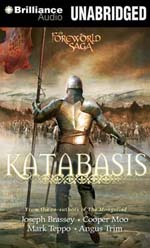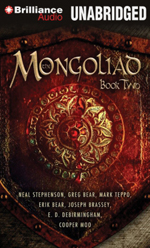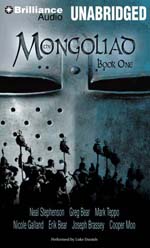
 Katabasis (Mongoliad Cycle #4)
Katabasis (Mongoliad Cycle #4)
By Mark Teppo, Joseph Brassey, Cooper Moo, and Angus Trim; Performed by Luke Daniels.
Publisher: Brilliance Audio
[UNABRIDGED] – 13 hours
Themes: / Mongoliad / martial arts / fantasy / monks / conquests / Mongols / Russia /
Publisher summary:
With the death of the fearsome Ögedei Khan, the Mongol invasion of the West has been brought to an abrupt halt. The defenders, a band of brave warrior monks known as the Shield-Brethren, limp homeward again across a frozen, bloodied wasteland. But where — and what — is “home” now that the threat of invasion no longer shapes their lives? Thirteenth-century Europe has been saved from annihilation at the hands of the Mongols, to be sure, but new and terrible threats are at hand: political and religious turmoil threaten to turn the warriors’ world upside down once more. Painted against a rich backdrop of medieval mysticism and Russian folklore, Katabasis weaves together the tales of victor and victim alike in a fearless exploration of what it means not just to survive, but to truly live again.
When I reviewed The Mongoliad: Book Three in the Foreworld Saga, I didn’t realize that there were to be a 4th and 5th entry into the series. The book ended with the end of a major story arc (if not the most satisfying of endings) and I thought it was okay to leave it there.
But the story didn’t end there. Where the story in the first three books in the series really covered the story of the Christians versus the Mongols, this book follows the Shield Brethren into Russia while the Mongols mostly start gathering to find their new Kahn of Kahns. There was a greater supernatural element in this book than in the previous ones, and it was interesting to see characters I thought we had left at the end of the first book (or thereabouts) make a reappearance. At the crux of this story seems to be old religion versus new religion. It is hinted that Cardinal Vieshi, a cardinal in Rome who we met in the 2nd and 3rd books, is behind an attempt by the Levonian Brotherhood to defeat the Shield Brethren and help “modern Catholics” take a hold in Russia. The old religion, though, the Shield Brethren, the Shield Maidens, and the native Russians, are on their own mission to keep the old religion not only still around, but still relevant. As part of this, the Spirit Banner, guarded so carefully by the Mongols in the first three books, is a central part to the plot with Ferronantus, Raphael, and the Shield Brethren. In a bit of an oddity, Leanne (former slave Chinese woman in Ogedai Kahn’s retinue) has managed to save the sliver of…well, it’s still not exactly clear what it is, but it’s important enough that GonSuk had her protect it and it was attempted to be stolen from Ogedai in the first book. This gives her a tie–if she’s not really clear on what the tie is–to the Spirit Banner and the Shield Brethren.
In some ways, this was a complete story. There was a central conflict, and the plot moved to bring that to a relatively satisfying ending. In some ways, the plot lines here were less confusing than in the previous books. There seemed to be fewer plots and fewer characters to keep track of, generally speaking. However, at the end, it got muddled. I suppose it might be just me–I often have felt like I’ve been “missing something” while listening to these books and this one was no different. Something happened at the end that I didn’t quite grok, and it’s obvious that it will play out for the 5th (and final, I think) book in the main Foreworld Saga. I hope that when I finish that one, it will make more sense.
Luke Daniels did the narration for this audiobook, as with the other Foreworld and Foreworld Prequel books that I have listened to. Sometimes, his narration is fantastic. He does different voices for the characters and makes it easy to get drawn into the world. However, between the odd names, multiple plot lines, and sometimes difficult/foreign words, it can be hard to understand what he’s saying or what’s going on. As with the other books, this is one that I think might be easier to read the print first, or at least have a copy handy so you can refer to the Cast of Characters and/or re-read confusing parts. Sometimes, Daniels would do lines in a characters voice and…well, in character. So if the character was to be whispering or muttering, Daniels would do that. This would make it hard to understand what he was saying, especially when he used the thick accents.
All in all, I think I liked this book better than I liked the end of the first three books. I look forward to seeing what happens in the 5th book–which I note is not narrated by Luke Daniels.
Posted by terpkristin.

 The Mongoliad Book Two
The Mongoliad Book Two The Mongoliad: Book One (Foreworld Saga #1)
The Mongoliad: Book One (Foreworld Saga #1)
